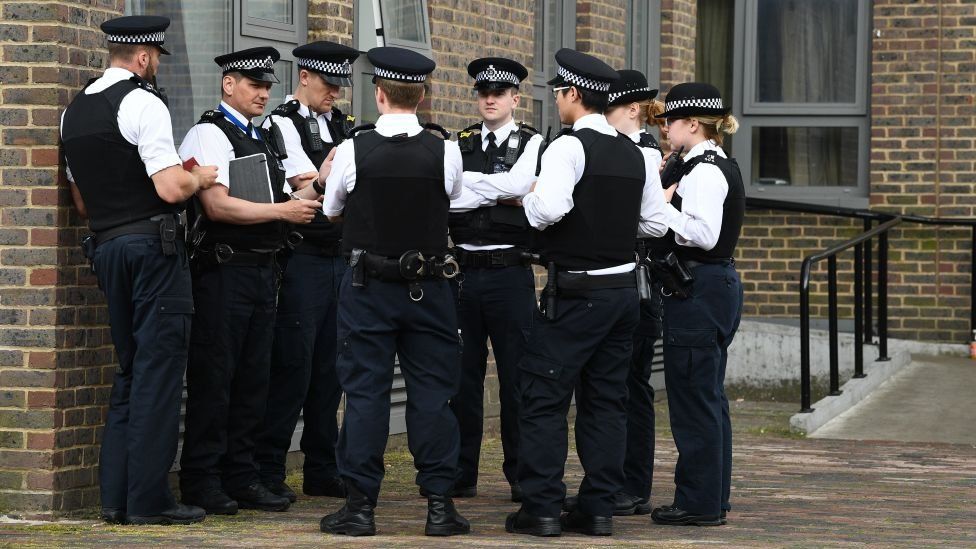Reality Check: Is police funding falling?
- Published

The impact of funding on rising crime is a matter of hot debate, but what is certain is that police forces in England and Wales have less money than they did in 2010.
Putting a precise figure on it is harder than you might think, however, because budgets are made up of different elements and these elements are not published officially in one place.
What's happened to budgets?
After five years of cuts, in 2015 the government committed to protecting English and Welsh police forces' budgets in real terms overall.
But there are big caveats to this.
Police forces in England and Wales mainly get their money from a combination of grants from central government - the biggest chunk - and money raised through council taxes.
There are also separate grants from central government which fund areas that are dealt with on a national level, like cyber-crime and counter-terrorism. Not every police force will receive this money.
Firstly, police spending is only protected in real terms overall once you include these national grants.
When it comes to funding individual forces' policing, budgets are protected in cash terms which means forces are still experiencing a real-terms cut because of the rising costs of policing.
For example, the Met is getting the same amount of money - its funding from government is not being reduced - but its costs are rising so it says it must find £400m in savings.
There are also big variations in how much money different areas are able to raise in council tax, and therefore how much they rely on grants from central government.
In Surrey which has more taxpayers and more valuable properties, the force gets 44% of its funding from central government. In Northumbria, where council tax take is lower, 83% of police funding comes from central government.
The Institute for Fiscal Studies says overall police budgets fell by 14% between 2010-11 and 2014-15.
BBC Reality Check calculates that between 2010 and 2017 there has been about a 20% cut in police funding in real terms.
As funding has fallen, so have numbers of police officers.
But government says it's putting more money in?
In December, Home Secretary Amber Rudd announced what she described as a "substantial" £450m increase in police funding in England and Wales.
This brings us to our second caveat.
More than half of this money (£270m) will be raised from council tax. It's not new money from government.
This commitment to protect budgets relies on police and crime commissioners putting up council tax by the maximum they are allowed.
The chunk of funding that comes from central government has been falling in cash terms in every year up to 2017-18. It is going to stay the same in 2018-19 as the year before.
The chairman of the UK Statistics Authority, Sir David Norgrove, has flagged the lack of transparency around police funding in the past.
He also said: "The prime minister's statement and the Home Office's tweet could have led the public to conclude incorrectly that central government is providing an additional £450m for police spending in 2018-19.
"The Home Office tweet also implied that the £450m sum is guaranteed. As the minister for policing's statement outlined, up to £270m of the funding settlement will come from local council tax, if police and crime commissioners and mayors choose to raise these sums."
What about the rest of the UK?
All UK forces have seen reductions to their funding since 2010.
In Scotland, there is a single police service, formed through the merger of eight forces in April 2013. The Police Service of Scotland (PSoS) is centrally funded by the Scottish government and has no council-tax raising powers, although local authorities are able to put some of their general budgets into funding local policing priorities.
Between 2013, when the single police service was formed, and 2016, the Scottish Police Authority's budget fell by about 9% in real terms.
Projections published in 2017 suggested the police service would be almost £200m in deficit by 2021.
In Northern Ireland, the police service's budget reduced by 17% between 2011 and 2015.
Northern Ireland also has a single police service, the Police Service of Northern Ireland (PSNI) which is centrally funded from Westminster. It bids for funding from the Treasury and cannot raise money through local taxes.